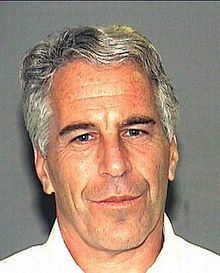
Jeffrey Epstein was put on suicide watch last month. Then he was taken off, and found dead in his cell at the Metropolitan Correctional Center in New York. It wasn’t the first time a sexual predator has been put on suicide watch. And it won't be the last.
Epstein’s contact list was full of the rich and famous. It included President Clinton, who flew on the Lolita Express. It included Prince Andrew, and President Trump. It included Ronald Perelman of Revlon, Tom Pritzker of Hyatt, Mort Zuckerman of US News & World Report, Nathan Myhrvold of Microsoft. It included Stephen Hawking! It included the Nobelists Gerard 't Hooft, Frank Wilczek, Murray Gell-Mann, and David Gross. It included the AI pioneer Marvin Minsky, and the theoretical physicist Lawrence Krauss.
Epstein had a number of contacts at Harvard. Alan Dershowitz, the lawyer, defended him. George Church, the geneticist, has apologized for being in the same room. Joi Ito, the media lab founder and a visiting professor, has apologized for more extensive ties. Martin Nowak, the group selectionist, was promised $30 million, got $6.5 million of that, and won’t be giving it back. When the Boston Globe ran an article on dinner parties that Epstein had hosted at Harvard, it pictured Dershowitz, Larry Summers, Steve Pinker—who is also apologetic, and the theoretical biologist Bob Trivers—who also received funds.
Trivers wrote his classic paper on "Parental Investment and Sexual Selection" for a volume called Sexual Selection and the Descent of Man, 1871-1971, in honor of Charles Darwin. He argued that access to the more parental sex will be competed over by members of the opposite sex. As he put it: "Where male parental investment strongly exceeds that of the female (regardless of which sex invests more in the sex cells) one would expect females to compete among themselves for males and for males to be selective about whom they accept as a mate." In some species, females compete for parental males. In many other species—including most mammals, most primates, and us—males compete for the parental investment of females. He made no moral judgment about either outcome.
Pinker has written eloquently and prolifically about evolutionary theory, and its application to our own species, in a number of essays and books, not least in his magnum opus on How the Mind Works. He's been explicit about the nature of our sex differences. And he's been explicit about our ability to find better natures. In his words: “A connected and educated populace, at least in aggregate and over the long run, is bound to be disabused of poisonous beliefs, such as that members of other races and ethnicities are innately avaricious or perfidious; that economic and military misfortunes are caused by the treachery of ethnic minorities; that women don't mind to be raped."
There have been sexual predators in history since history began. But none of them bothers me as much as Jeffrey Epstein. He targeted very young women. And with many of the same assets—islands and Manhattan townhouses, social connections and money—he seduced some of my friends.
Most meteorologists don’t study the weather in order to cause flooding. Most seismologists don’t study earthquakes hoping to make buildings collapse. Epidemiologists don’t cause epidemics. We all want, as a group, to cure diseases, avert geological disasters, and stay on high ground.
I don’t study evolution—and nobody I know studies evolution—to exonerate the promiscuous. The end of differential reproduction is despotism. I want us—and everybody I know who studies evolution wants us—to move in the other direction. Toward greater egalitarianism; away from despotism.
We want to get at the root causes of injustice.
Not to aid or abet it.
But to end it.
References
Trivers, R. L. (1972). Parental Investment and Sexual Selection. In B. Campbell (Ed.), Sexual Selection and the Descent of Man, 1871-1971 (pp. 136-179). Chicago, IL: Aldine.
Pinker, S. (2012). The Better Angels of Our Nature. New York: Penguin.


